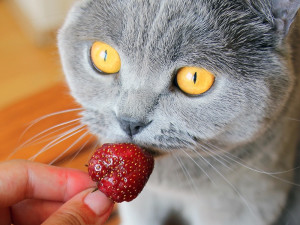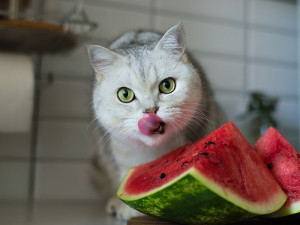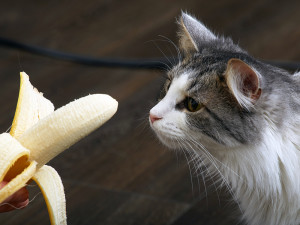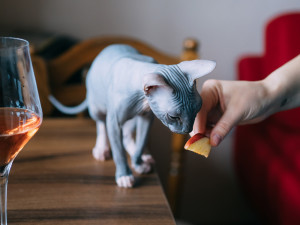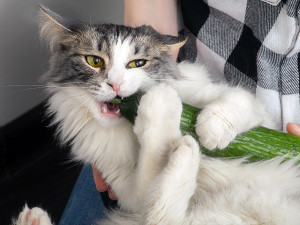Can Cats Eat Raspberries?
One of the sweetest summer treats.

Share Article
Raspberries are one of those decadent little gems of summer that, yes, luckily, your cat can indulge in, too. Raspberries are also packed with powerful nutrients that can benefit your cat. The big question will be whether your cat actually has any interest in them. Read on to learn more.
Nutrition facts about raspberries for cats
Raspberries come from a plant in the Rosaceae family called the Rubus idaeus plant, also known as the American red raspberry. The fruits of the plant are not technically berries but are known as aggregate fruits composed of drupelets, or individual seeds surrounded by fruit that are then all bunched together to form a raspberry as we know it. This explains why they have so many dang seeds.
Despite their seediness, they tend to have a sweet juicy flavor and are nutritious, too. Not only are they a superfood among us humans, they also serve as an important food source for many kinds of wildlife. Cats can benefit from some of the nutrients found in raspberries too.
Are raspberries good for cats?
Well, yes and no. The truth is that raspberries, like most fruits and vegetables, are not a typical part of a cat’s diet.

Cats are obligate carnivores which means their diet is traditionally whole animal prey. Their bodies are built to run primarily on animal-based sources of protein, fat, and other nutrients they get from eating animals. Usually, their minimal plant intake comes from whatever was already in the digestive tract of the prey they ate. That said, there are some really hearty nutrients in raspberries that cats can benefit from. And while they should never be more than just an occasional snack, here’s why they are good for cats:
Fiber: Raspberries are high in fiber, partially thanks to all those tiny seeds. Fiber helps to add bulk to the stool, prevents constipation, and provides nutrients to the microbiome of the gut.
Water: Raspberries, like many fruits, contain a lot of water. Cats tend to drink minimal amounts of water and sometimes need to be motivated to drink more. This is especially true for cats with certain health problems including kidney disease or urinary problems.
Vitamins and minerals: Raspberries are also chock full of potassium, calcium, magnesium, Vitamin K, and iron, all of which are critical to normal life functions for your cat. As long as your cat is eating a complete and balanced cat food diet, they are already getting plenty of these, and anything they get from raspberries and other snacks is a great bonus.
Antioxidants: Raspberries are considered a superfood mainly because of their antioxidants, including anthocyanin and ellagitannin. These plant compounds may have health benefits including slowing the aging process, reducing inflammation, preventing certain kinds of cancer, and producing positive effects on metabolism.
Can cats eat any part of the raspberry plant?
Technically, the plant is considered non-toxic to cats, so if your cat were to gnaw on a branch or leaf from a raspberry plant, there is no need to panic. But there are some good reasons to prevent your cat from eating too much of the plant matter.
Like most plants, the leaves, stems, and branches contain large amounts of indigestible fibrous material, like lignin and cellulose. If your cat consumes large amounts of plant material, they are likely to develop digestive upset including vomiting, decreased appetite, or diarrhea. Also, the leaves of the raspberry plant contain compounds that can stimulate uterine contractions, labor, or miscarriage in pregnant animals and humans. If your cat is pregnant, you should keep them away from raspberry plants as a precaution.
Are raspberries completely safe for cats?
Overall, raspberries are quite safe for cats. There are a few important points to keep in mind if you plan to share raspberries with your cat:
High-fiber content: Raspberries are celebrated for their fiber content, but too much fiber can be detrimental, especially if your cat is not used to it. Too much fiber can cause bloating, gas, and digestive upset. It is best to limit fibrous foods to just a small taste and see how your cat tolerates it.
Sugar content: Raspberries are actually lower in sugar than many other fruits, making them a better choice for the occasional kitty snack. However, some cats should avoid any added sugars in their diet, especially if they are diabetic or obese. And since cats don’t have the taste receptors to appreciate sugar, raspberries may not appeal to your cat anyway.
Beware of other ingredients: If you are sharing a prepared food or baked dish containing raspberries, be mindful that the other ingredients may not be OK for your cat. This includes rich, high-fat dairy ingredients, like butter or cream, as well as dishes that are high in sugar. The best option is to share fresh, plain fruit with your cat.
The bottom line: Can cats eat human food?
There are many human foods that cats can eat and that may be both safe and healthy for them. Always keep in mind that cats are unique creatures with their own specific nutritional needs. What’s good for us isn’t always good for them.
For this reason, it is most important that you feed your cat a complete and balanced cat food diet as the bulk of what they eat. This ensures all of their needs are met. Then, as an occasional special treat you can have fun sharing small snacks with your cat.
Be sure to keep those snacks to less than 10 percent of your cat’s total intake so they eat enough of their cat food and that they don’t overeat. Indoor cats are at an increased risk of obesity because they tend to be inactive during much of the day, so being mindful of their total caloric intake while also encouraging play and mentally enriching activities will help to keep your cat healthy and happy.
Other foods that are safe for cats
Tuna is a high-protein snack that is safe in moderation.
Yogurt is also OK in small amounts as long as it is low in sugar.
Broccoli is also fine as a small treat.
Other foods that are dangerous
Ice cream and other rich, high-sugar dairy foods should be avoided.
Chocolate is actually toxic to cats.
Garlic, onions, and other plants in the Allium family are also toxic to cats.
FAQs (People also ask):
How many raspberries can a cat eat?
A few bites as an occasional treat is OK, but too many can cause digestive upset.
Is it OK to give cats raspberries?
Yes, raspberries are not toxic and safe in small amounts.
Why do cats like raspberries?
Cats may not like raspberries as they cannot taste sweet foods.
Can cats eat raspberry leaves?
The leaves are not toxic but are high in fiber, and can also induce labor in pregnant animals.
References:

Dr. Amy Fox, DVM
Amy Fox, DVM is a small animal veterinarian in New York City with over thirteen years of experience in a mixture of general practice, emergency medicine, and shelter medicine. A lifelong animal lover, Dr. Fox studied biology in college and then worked as a veterinary nurse before pursuing veterinary school at Cornell University. Her expertise includes surgery, dentistry, and management of chronic conditions, and she is interested in toxicology, pain management, nutrition, care of senior pets, and educational outreach. Dr. Fox also enjoys writing about veterinary medicine and teaching, and her work has previously appeared in Spruce Pets. In her free time, she loves to cook, garden, go for long runs, and hang out with her goofy mixed-breed dog May, who provides never ending comic relief!
Related articles
Can Cats Eat Lemons?
They don’t go for citrus the same way you do. Here’s why.
![Grey cat eats a strawberry]()
Can Cats Eat Strawberries
Yes, strawberries are a nutritious treat for dogs.
![White kitten with tongue out next to slices of watermelon]()
Can Cats Eat Watermelon and Watermelon Rind?
Yes, watermelon is a nutritious treat for cats.
![A cat staring at a peeled banana]()
Can Cats Eat Bananas?
Gwen Stefani taught us how to spell it, but can we feed this fruit to our cats?
![Cat eating from a plate of raspberries and blueberries]()
Can Cats Eat Blueberries?
Go ahead and serve up the superfood — with a couple caveats.
![A gray Sphynx cat sniffing an apple slice held out by her owner while standing on a table next to a glass of wine]()
Can Cats Eat Apples?
Yes, but the fruit might not hold much a-peel.
![A kitten sniffing a ripe half of an avocado in a bowl]()
Can Cats Eat Avocados?
Just don’t get out the guacamole bowl.
Can Cats Eat Peaches?
Fat-peach season at the farmers’ market is upon us.
Can Cats Eat Cucumbers?
We already know they’re scared of them, thanks to all those YouTube videos.


